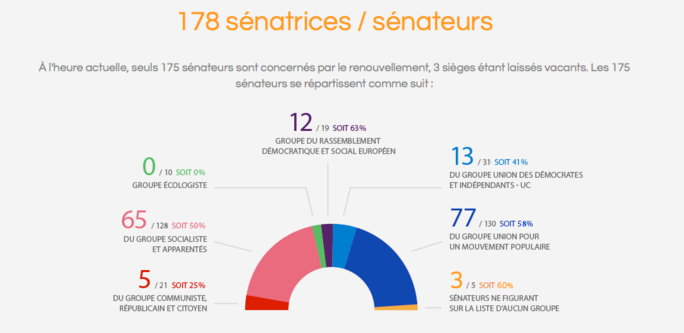In the history of the Fifth Republic, the Left has rarely had control of the Senate and on Sunday it handed control back to the Right after having held sway in France's upper chamber of parliament for just three years. The weekend's partial elections for the Senate saw a particularly strong performance from the centrist Union des démocrates et indépendants (UDI) party who will form an alliance with the main right-wing opposition party, the UMP.
The outcome will not have come as a shock to the government nor will it unduly alarm it. President François Hollande and prime minister Manuel Valls knew in advance of the elections that the Senate was lost, and they still command an absolute majority in the National Assembly which has the final say on all legislation.
Yet Sunday's results represent another defeat for an unpopular government which has made something of a habit of losing elections in recent months. It has now lost eight parliamentary by-elections, the local council elections in March and the European elections in June. It looks set to lose further local elections scheduled for March 2015 and regional elections due the following December.
The other main event of Sunday's poll was the arrival of the Front National (FN) for the first time in France's upper house, with the far-right party picking up two seats. “An historic victory,” was the verdict of the party's president Marine Le Pen. Usually it is extremely hard for the FN to make any headway in Senate elections as the electorate consists not of the general public but of elected local representatives such as mayors, councillors from regional councils and council representatives from local départements, which are broadly similar to counties. This group of elite voters are known in France as 'grands électeurs'. But a new element of proportional representation introduced this year helped win Senate seats for the FN's Stéphane Ravier, who was elected mayor of Marseille's seventh district in March, and David Rachline, who is the mayor of Fréjus, also in the south of France. At 26, David Rachline will be the youngest member of the Senate. He was elected with the support of a large number of grands électeurs from the Right in the département of the Var. This underlines the extent to which the barriers between the electorate of the traditional Right and that of the FN have eroded in the south-east of France.

Enlargement : Illustration 1

The Socialist Party, meanwhile, was putting a brave face on the reverses suffered in Sunday's voting, pointing out that the loss of seats was not as heavy as had been predicted. Indeed, some in the party pointed to what they called “minor miracles” as Yves Daudigny in the département of the Aisne in the north, Alain Anziani in the Gironde in the south-west and Samia Ghali in Marseille all clung on to their seats. The party's first secretary Jean-Christophe Cambadélis said the PS had done better than might have been expected given its poor showing in the local elections, which in effect chose the mayors eligible to vote in Sunday's Senate poll. He dismissed any suggestion of a “blue wave”, referring to the political colours of the opposition UMP.
The Left in any case had a slim majority of just six votes in the Senate after taking control there in 2011 elections. After Sunday it looks as if the socialists, communists and members of the radical left have lost 21 seats between them. The Right – the UMP and the centrist UDI – have gained 23 seats in all, with the UDI doing particularly well to pick up nine of them. This means that the UMP and UDI will together have a majority of 15 in the upper chamber.
Elections for the Senate are held every three years with half its seats – 178 – up for re-election each time. Out of the 65 of its senators whose seats were being contested on Sunday, the PS lost ten. The biggest losers were the PS's close allies the Radical de Gauche (RPG) party which lost seven of its 12 seats up for grabs. The communists, meanwhile, lost three out of the five of their seats that were contested. They later blamed their losses on two key issues; cuts in local authority funding – estimated at eleven billion euros between now and 2017 – and the plans to reform France's regions. “Many 'grand électeurs', who are for the most part local representatives, have expressed their rejection of a local authority reform that continues along the same logic of dismantling the Republic and of public services pursued in Nicolas Sarkozy's legislation,” the communist group in the Senate said in a press release on Sunday night.
Click here for detailed results of the elections (in French).

Enlargement : Illustration 2

“Three factors explain this result,” said a close aide of François Hollande. “The result of the local elections, a local government reform that hasn't been well understood and the fragmentation of the Left.” The PS, the hard-left Front de Gauche and the radical left all stood as individual candidates against each other after failing to reach an electoral accord. “The Left could have saved some seats if there had been an agreement,” agrees Emmanuelle Cosse, secretary general of the green party Europe Écologie-Les Verts (EELV). The EELV itself did not have any senators up for re-election on Sunday.

Enlargement : Illustration 3

Yet despite the official satisfaction shown by the PS, both the party and its radical left allies suffered some symbolic defeats. In the Bouches-du-Rhône, the département which includes Marseille, the PS suffered a major setback. Out of its four incumbent senators only Samia Ghalia, who had tried unsuccessfully to be the party's candidate for mayor of Marseille in March, was re-elected, and even then only just. In the afternoon she thought she was certain to lose, even announcing it by text from the party's Paris headquarters.
The PS was humiliated in the Bouches-du-Rhône not by the Right but by a former senior party figure, Jean-Noël Guérini. The current president of the council - conseil général - of Bouches-du-Rhône, Guérini left the party in April, before he could be thrown out. On three occasions he has been placed under formal investigation – one step short of charges being brought – on suspicion of various offences ranging from obstructing the course of justice, illegal conflict of interest and influence peddling to misuse of public funds.
Standing as head of a dissident list of candidates, Guérini picked up three times more votes than his socialist rivals, and not only was he elected as a senator but so, too, were two of his fellow dissidents. His campaign took the side of the local mayors and councillors unhappy about the future Marseille metropolitan authority, and he held up the prospect of local authority funding from his own département for those who backed his line. On Sunday Samia Ghalia, who had been on Guérini's official socialist list when she stood as a senator in 2008, attacked what she said was “public money being distributed” to “buy” votes. However, the powerful Guérini and his allies may still sit with the socialist group in the Senate. “Guérini remains a socialist...a Marseille socialist,” said one party source.
Snub for Hollande's advisor
The Socialist Party suffered other high-profile defeats too. In the Corrèze département in central France, where François Hollande was once head of the local council, the Right took the two Senate seats from the socialists. Hollande's own advisor and successor as mayor of Tulle, Bernard Combes, who was prompted by the president himself to stand, failed in his bid to win a seat. Another Hollande ally, the former European affairs minister Thierry Repentin, was also beaten in Savoie in east France. Meanwhile Jean-Pierre Michel, the former socialist MP who, in the 1990s, was the man behind the creation of the civil partnership status known as the Pacte civil de solidarité (PACS), was beaten in the Haute-Saône in east France where the Right won both seats.
Another dissident socialist who was re-elected was Robert Navarro in the Hérault département in the south. In late 2012 he was placed under formal investigation for alleged breach of trust, following a complaint by the PS over his handling of the Hérault party federation. According to his critics, he used sporting events during this latest campaign to help persuade local mayors and councillors to back him as senator. “For the last three weeks he has invited grands électeurs to every possible match, taking advantage of offers from the region [editor's note, he was acting president of the Languedoc-Roussillon region until September 29th, the day after the Senate election].
The Radical de Gauche party, which has a cabinet minister and two junior ministers in the government, suffered serious defeats in Sunday's election. In Belfort in eastern France the seat previously held by the maverick former minister Jean-Pierre Chevènement – who was not standing again – was won by the UMP, who beat the RPG candidate, former minister Anne-Marie Escoffier, in the first round.
But the RPG's biggest blow by far was the defeat in south-west France of its president Jean-Michel Baylet, who is also president of the Tarn-et-Garonne département council and head of the local press group La Dépêche du Midi. He has been a senator there since 1995 but the local branch of the RPG has recently been split by internal squabbles and rivalries. “This is proof that his local operation has run out of steam,” said one senior PS official. “The grand électeurs in his département rebelled,” explained another.

Enlargement : Illustration 4

Baylet could have been named a government minister himself in 2012 had he not been faced with potential criminal prosecution at the time. In June 2014 proceedings against him were dropped in relation to allegations of breaching local authority rules on fair competition between rival suppliers for public contracts. After the EELV decided earlier this year that it no longer wanted to be part of the government, the RPG's clout as a loyal ally had increased. Baylet used that new status to good effect when he successfully lobbied the president to drop plans to abolish département councils in rural areas.
In contrast with the RPG, the opposition UMP was celebrating its successes on Sunday night. Former minister François Baroin, already an MP in Aube, east of Paris, and who recently gave his backing for the bid by former president Nicolas Sarkozy to be head of the UMP, was voted in as senator. There was also a return to front-line politics for Alain Joyandet who quit as a minister in Sarkozy's government in 2010. Mediapart had revealed that he had charted a private jet to Martinique in the French Caribbean at a cost to the taxpayer of 116,500 euros.
But with the dust barely settled on the Senate elections, a new battle was looming inside the UMP itself about who is to be the new president of the upper chamber now that the Right has regained control. The outsider is finance expert Philip Marini, but the main contest is expected to be between former prime minister Jean-Pierre Raffarin and Gérard Larcher, who was president of the Senate from 2008 to 2011. After the results came in, Larcher immediately began courting the votes of the UDI, declaring: “Whoever is chosen must have the trust of our centrist friends.” Raffarin, who is supporting the right-wing Sarkozy in his bid to be head of the UMP, may find it harder to get the centrists to back him. The vote for the Senate presidency takes place on Wednesday October 1st.
----------------------------------------------------------------
- The French version of this article can be found here.
English version by Michael Streeter


